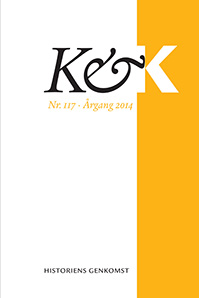SEFARAD - BIDRAG TIL EN FÆLLES EUROPÆISK ERINDRING
DOI:
https://doi.org/10.7146/kok.v42i117.17565Nøgleord:
cultural memory, Spain, Antonio Muñoz Molina, cosmopolitan memory, Spanish civil war & holocaust, globalization, multidirectional memoryResumé
A CONTRIBUTION TO A COMMON EUROPEAN MEMORY | Since 1975 Spain has been engaged in the recuperation of the memory of the past. Yet there seems to be an agreement that it is only over the course of the last ten years that an open and genuine debate has started. The purpose of this article is to re-think the argument, stating that what is at stake is really a change of form in the memory debate. Drawing on theories from Astrid Erll (2011) and Michael Rothberg (2009), the article aims to show how the novel Sefarad by the Spanish author Antonio Muñoz Molina could be read as a literary manifestation of a multidirectional memory, in which different memory scenarios in dialogue inscribe the memory of the Spanish Civil War and the subsequent dictatorship into a common European memory context. Moreover, the article argues that Sefarad positions itself as a paradigmatic example of a global cosmopolitan memory discourse which tries to transcend traditional Manichean divisions between “us” and “them”. In the context of Spanish contemporary politics, it is hard to imagine how a cosmopolitan approach should be implemented without risks of political (ab)use. In that respect it will be argued that the literary discourse, seen as a reconciliatory discourse, takes precedence over other discourses in the ongoing memory debate by emphasizing a collective and transnational responsibility for the past.
Downloads
Citation/Eksport
Nummer
Sektion
Licens
Tidsskriftet følger dansk ophavsret.





